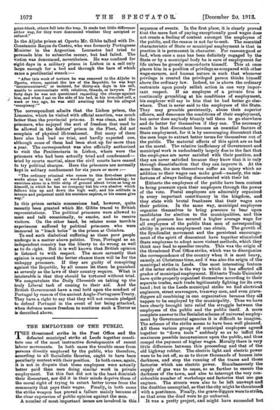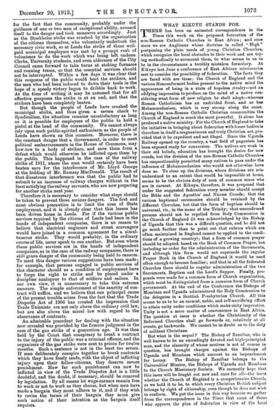THE EMPLOYEES OF THE PUBLIC.
THE threatened strike in the Post Office and the defeated municipal strike at Leeds together consti- tute one of the most instructive developments of recent labour movements. In both cases the trouble came from persons directly employed by the public, who therefore, according to all Socialistic theories, ought to have been peculiarly content with their position. In both cases, again, it is not in dispute that these employees were actually better paid than men doing similar work in private employment. Yet this fact did not in the least diminish their discontent, nor did it in their minds deprive them of the moral right of trying to extort better terms from the community that pays their wages. Finally, in both cases the strike weapon has proved a failure mainly because of the clear expression of public opinion against the men.
A number of most important issues are involved in this
sequence of events. In the first place, it is clearly proved that the mere fact of paying exceptionally good wages does not create a feeling of content amongst the employees of the public, and the reason is not far to seek. The essential characteristic of State or municipal employment is that in practice it is permanent in character. For reasons good or bad, when once a man has been definitely engaged by the State or by a municipal body he is sure of employment for life unless he grossly misconducts himself. This at once places him in a position of privilege as compared with other wage-earners, and human nature is such that whenever privilege is created the privileged person thinks himself above the ordinary law. Indeed, lie is above the ordinary restraints upon purely selfish action in one very impor-
tant respect. If an employee of a private firm is continually grumbling at his conditions of employment, his employer will say to him that he had better go else- where. That is never said to the employees of the State. They may grumble persistently, abuse then superior officers, and denounce the conditions of their employment, but never does anybody bluntly tell them to go elsewhere and do better for themselves if they can. The necessary result is that discontent becomes an essential feature of State employment, for it is by encouraging discontent that the men hope to extract better terms for themselves out of the public. The material effects of this spirit are as bad as the moral. The relative inefficiency of Government and municipal work is undoubtedly largely due to the fact that the employees are never satisfied with their position. and they are never satisfied because they know that it is only through dissatisfaction that they can improve it. At the same time, the men themselves suffer an injury which no addition to their wages can make good—namely, the mis- fortune of always feeling discontented with their lot Hitherto the employees of the public have been content to bring pressure upon their employers through the power of the vote. Postal employees are admirably organized in every important constituency in the kingdom, and they state with brutal frankness that their wages are their politics. In the same way, municipal employees organize themselves to bring pressure to bear upon candidates for election to the municipalities, and this form of pressure has secured a higher average wage for all employees of the public than men of corresponding ability in private employment can obtain. The growth of the Syndicalist movement and the persistent encourage- ment of the spirit of discontent have together stimulated State employees to adopt more violent methods, which they think may lead to speedier results. This was the origin of the threatened Post Office strike, which was to disorganize the correspondence of the country when it is most heavy, namely. at Christmas time, and it was also the origin of the municipal strike in Leeds. One most interesting feature of the latter strike is the way in which it has affected all grades of municipal employment. Hitherto Trade Unionists' have quite properly organized themselves according to their separate trades, each trade legitimately fighting for its own hand ; but in the Leeds municipal strike we find electrical engineers, street scavengers, tramway men, and even grave- diggers all combining in one organization because they all happen to be employed by the municipality. Thus we have here clearly brought into relief the struggle between the employees of the public and the public itself. A more complete answer to the Socialist scheme of universal employ- ment by Governmental agencies it is difficult to imagine. The scheme of the strike seems to have been well planned. All these various groups of municipal employees agreed together to "down tools " suddenly so as to inflict the maximum possible inconvenience upon the public, and thus compel the payment of higher wages. Morally there is very little difference between this proceeding and that of the old highway robber. The electric light and electric power were to be cut off, so as to throw thousands of houses into darkness, and stop the running of the trams and those factories which use electric power. Simultaneously the supply of gas was to cease, so as further to ensure the darkness of the town, and also to interrupt the very con- siderable number of workshops and factories that use gas engines. The streets were also to be left unswept and the dustbins uneinptied, so that the city might be threatened with a pestilence. Finally, the grave-diggers were to strike, so that even the dead were to go unburied.
It was a pretty project, and might have succeeded but for the fact that the community, probably under the guidance of one or two men of exceptional ability, aroused itself to the danger and took measures accordingly. Just as the Stockholm strike was crushed by the organization of the citizens themselves, who voluntarily undertook the necessary civic work, so at Leeds the strike of these well- paid municipal employees was met by a prompt rush of volunteers to do the work which was being left undone. Clerks, University students, and even aldermen of the City Council came forward to take turns at stoking furnaces and running trams, so that the essential services should not be interrupted. Within a few days it was clear that this response of the public would beat the strikers, and the men who had been induced to down their tools in the hope of a speedy victory began to dribble back to work. At the time of writing it may be assumed that for all effective purposes the strike is at an end, and that the strikers have been completely beaten. But though the people of Leeds have crushed the municipal strike, and thus given a. severe check to Syndicalism, the situation remains unsatisfactory as long as it is possible for employees of the public to hold a pistol at the head of the community. We cannot always rely upon such public-spirited enthusiasm as the people of Leeds have shown on this occasion. Moreover, there is the constant danger that a Government, in order to meet political embarrassments in the House of Commons, may kow-tow to a body of strikers, and save them from a defeat which would otherwise be inflicted upon them by the public. This happened in the case of the railway strike of 1911, where the men would certainly have been beaten save for the interference of Mr. Lloyd George at the bidding of Mr. Ramsay MacDonald. The result of that disastrous interference was that the public had to submit to an increase of railway charges without in the least satisfying the railway servants, who are now preparing for another strike next year. Therefore it is necessary to consider what steps should be taken to prevent these serious dangers. The first and most obvious precaution is to limit the area of State employment, and it is already clear that this lesson has been driven home in Leeds. For if the various public services required by the citizens of Leeds had been in the hands of independent companies, there is no reason to believe that electrical engineers and street scavengers would have joined in a common agreement for a simul- taneous strike. They would probably, in the ordinary course of life, never speak to one another. But even where these public services are in the hands of independent companies, as in the case of the railway companies, there is still grave danger of the community being held to ransom. To meet this danger various suggestions have been made; for example, that persons engaged in public services of this character should as a condition of employment have to forgo the right to strike and be placed under a discipline analogous to that of soldiers and sailors. In our own view, it is unnecessary to take this extreme measure. The simple enforcement of the sanctity of con- tract will suffice, and we believe that one principal cause of the present trouble arises from the fact that the Trade Disputes Act of 1906 has created the impression that Trade Unionists are not only above the ordinary civil law, but are also above the moral law with regard to the observance of contracts.
An admirable precedent for dealing with the situation now revealed was provided by the famous judgment in the case of the gas strike of a generation ago. It was then held by the Court that conspiracy to break a contract to the injury of the public was a criminal offence, and the organizers of the gas strike were sent to prison for twelve mouths. Such a sentence is not in the least too severe. If men deliberately conspire together to break contracts which they have freely made, with the object of inflicting injury upon their fellow-citizens, they deserve severe punishment. How far such punishment can now be inflicted in view of the Trade Disputes Act is a little doubtful, and the doubt, if necessary, should be removed by legislation. By all means let wage-earners remain free to work or not to work as they choose, but when men have made a bargain they must adhere to it., and if they wish to revise the terms of their bargain they must give such notice of their intention as the bargain itself requires.











































 Previous page
Previous page